Last updated on 05/28/2014
5/27/2014 These are significant changes to the student conduct code. They are important and needed and some parts will be controversial. This post is worth reading in full, especially if you are a voting member of the Senate.
The USDOE Office of Civil Rights recommended changes to student conduct codes in 2011, but VPSA Robin Holmes dropped the ball, busy with other things. On May 14th President Gottfredson told the UO Senate we were to blame for the delays in fixing the student conduct code. But the truth is the administration fumbled this badly. Carl Yeh, Gottfredson’s Director of Student Conduct, told UO he was leaving for OSU in August 2013. The UO administration did not get a new Director until March 31st 2014. The Director is an ex-officio administrative appointment to the Student Conduct Committee, and the convenor. Sort of hard to hold a productive meeting without a Director, given that he’s the convenor. For a matter this important Holmes should have stepped in herself. Instead she hired a consultant and then sat on his report for 6 months, apparently without even convening the committee.
After the March 8-9 basketball rape allegations finally became public May 5, UO Law professors John Bonine and Caroline Forell stepped in. They have done an amazing amount of work over the last few weeks to try and get a revised code in place before the new students arrive in September. All in all there will now be 4 motions on the table for the Senate meeting this Wednesday, 3PM, 115 Lawrence, along with a full slate of other business. Three relatively minor ones come from UO’s new Director of Student Conduct Sandy Weintraub, the last is from Bonine and Forell, and it has also been reviewed by Weintraub.
4.8 Motion (Legislation): Proposed Change to Student Conduct Code to Standard Preponderance of Evidence; Student Conduct and Community Standards Committee (Sandy Weintraub, Director of Student Conduct and Community Standards)
4.9 Motion (Legislation): Proposed Change to Student Conduct Code to Extend Jurisdiction Off Campus; Student Conduct and Community Standards Committee (Sandy Weintraub, Director of Student Conduct and Community Standards)
4.10 Motion (Legislation): Proposed Change to Student Conduct Code Regarding Definition of Words; Student Conduct and Community Standards Committee (Sandy Weintraub, Director of Student Conduct and Community Standards) [Suspension of the Rules]
4.11 Motion (Legislation): Proposed Revisions to Student Conduct Code Dealing with Sexual Misconduct; John Bonine, Professor (Law) [Suspension of the Rules]
These 4.11 revisions significantly expand the protections for those making accusations of sexual assault to level the playing field, and they make many other significant changes as well.
For background, Bonine and Forell’s video summary from the 5/21 Senate meeting is here:
Bonine and Forell’s detailed 5/22 explanation for the need for the revisions is here. New UO Ombudsman Bruce MacAllister has written a lengthy, thoughtful memo about the first draft of these revisions, here, endorsing some and criticizing others. Strangely, there has been no word from UO General Counsel Randy Geller’s office. Geller announced his resignation hours before the rape allegation story broke, and while he’s still on the books as GC until June 30th, no one has seen him since.
Below are the most significant revisions, from my initial read. However I strongly suggested reading the full proposal here, instead of my hack job post.
Bonine and Forell have highlighted the parts relating to sexual assault and violence in yellow, to make that easier. Additions are in red with brackets, strikeouts for deletions, blue for explanations from Bonine and Forell, and green for comments from Sandy Weintraub:
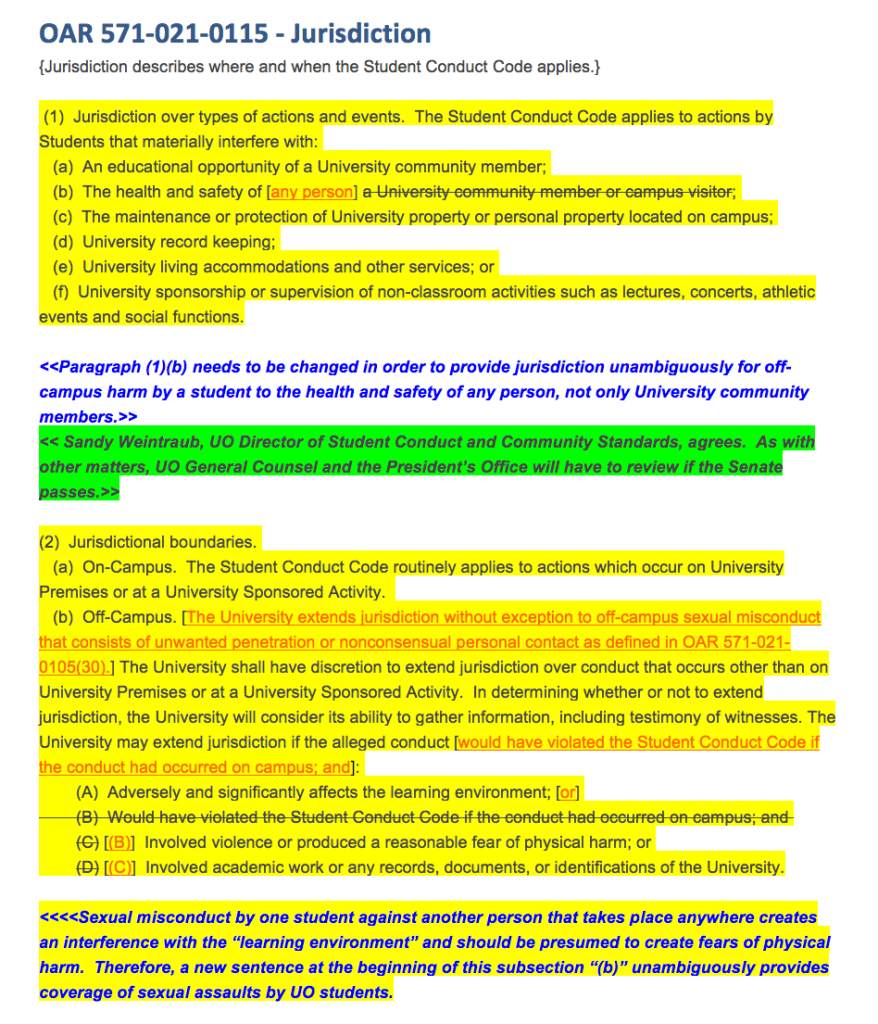
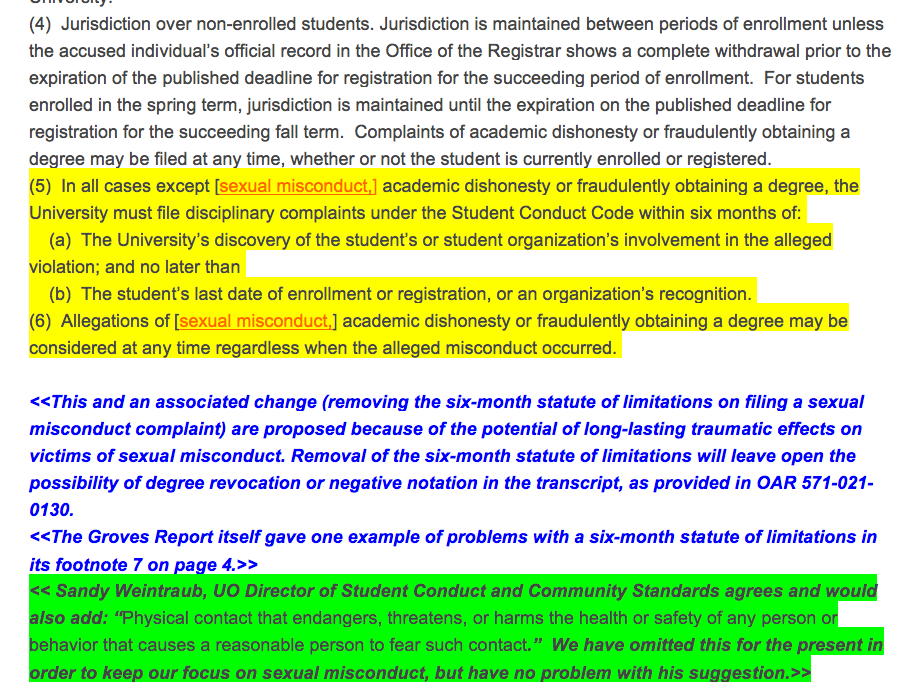
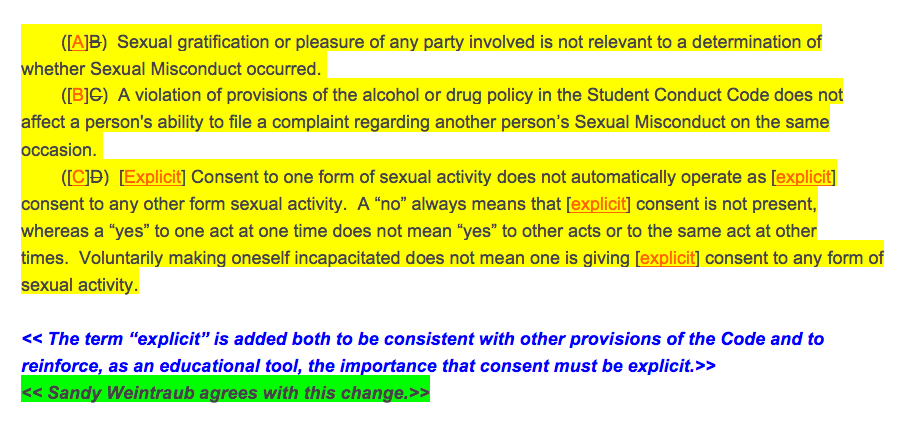
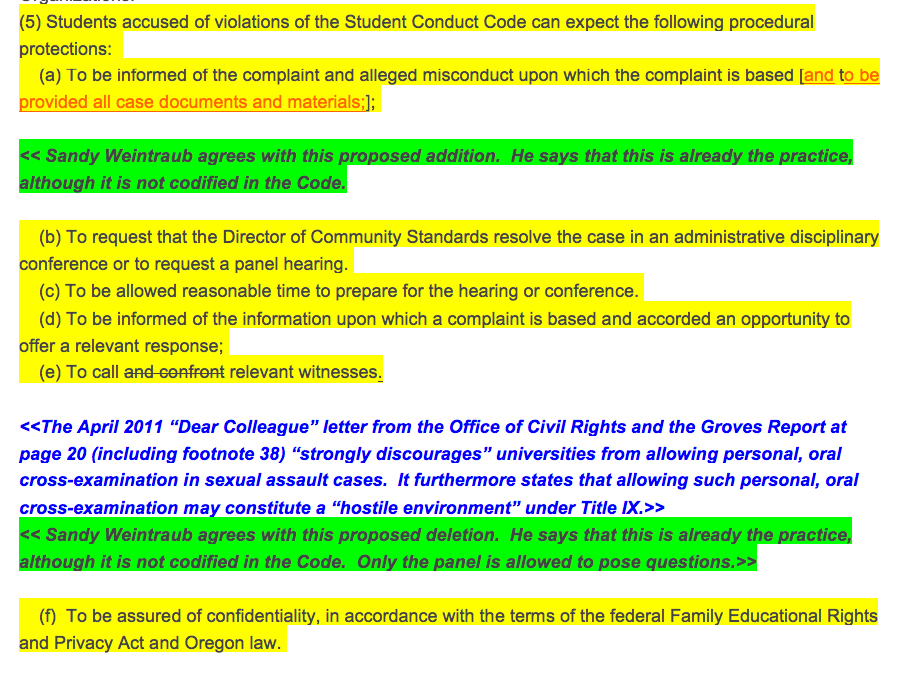
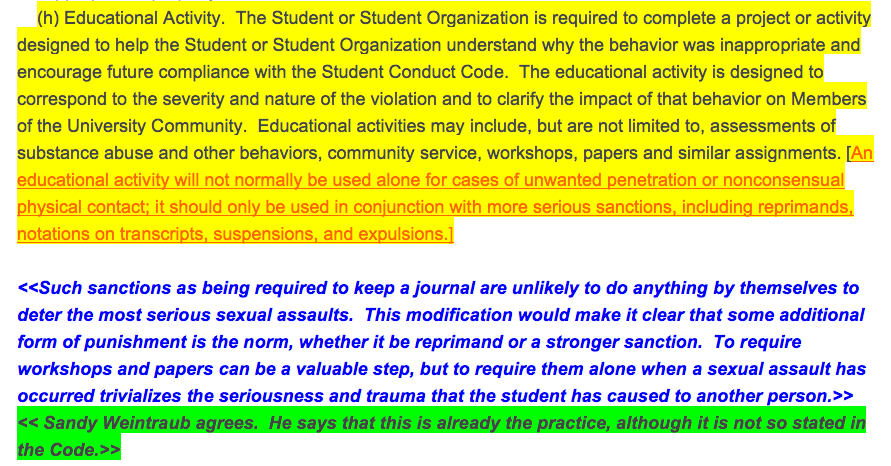
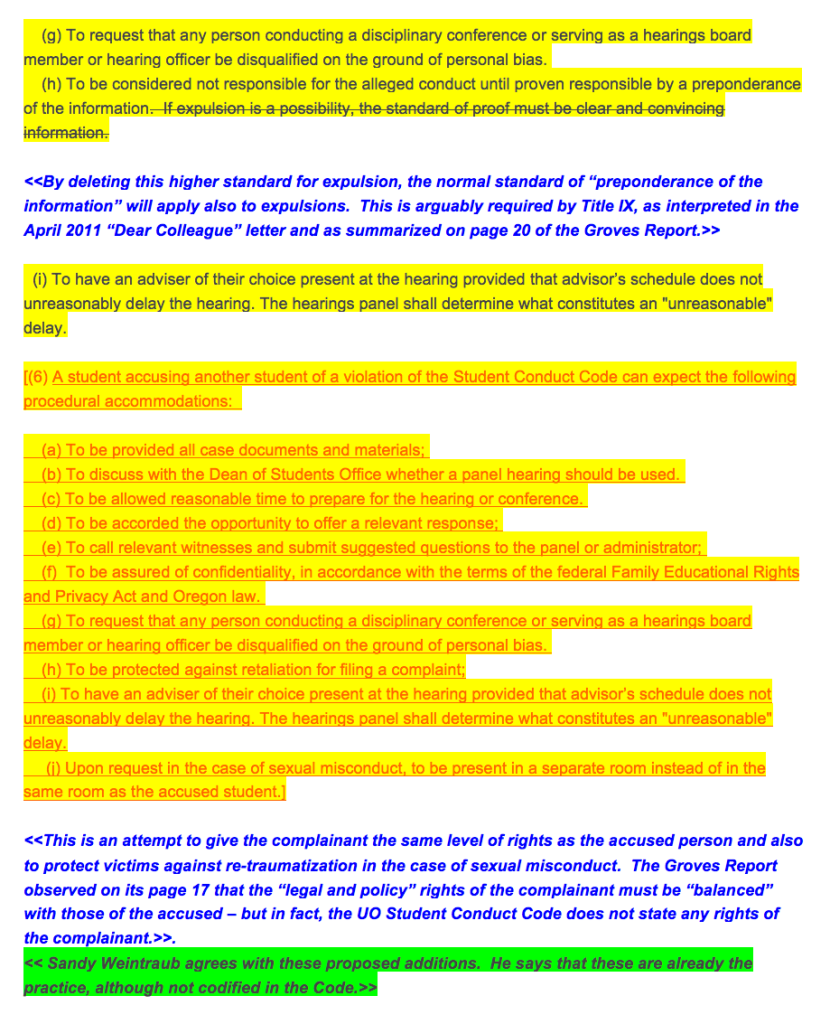
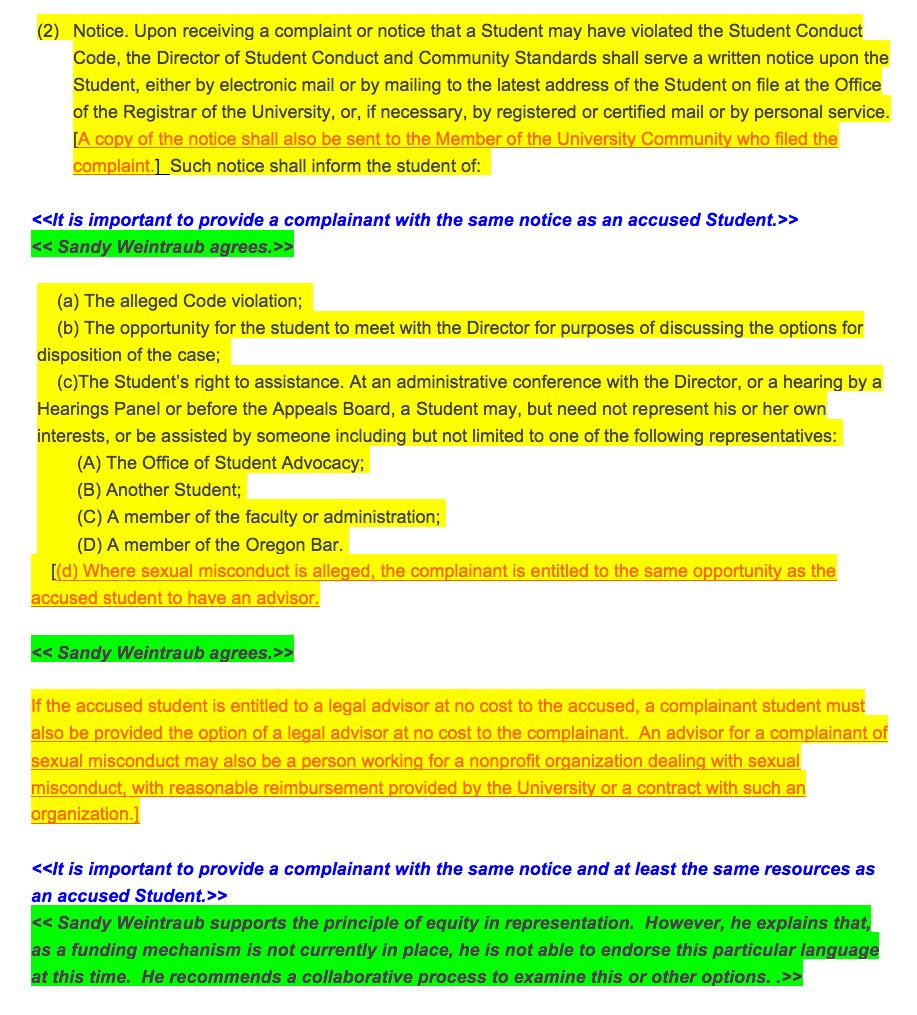
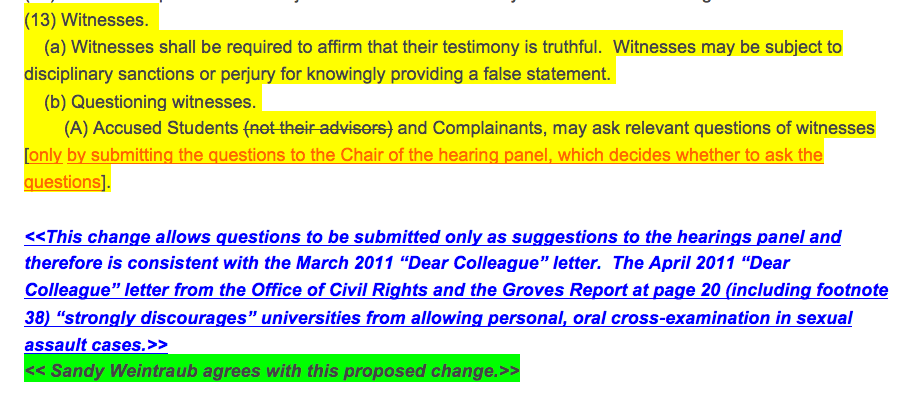
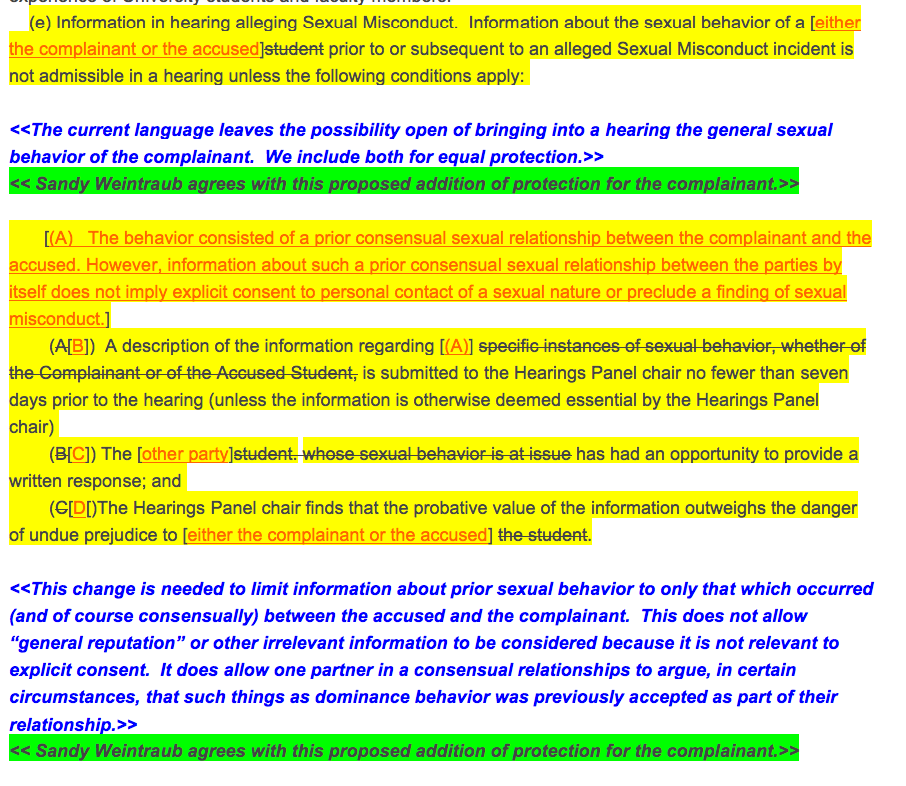
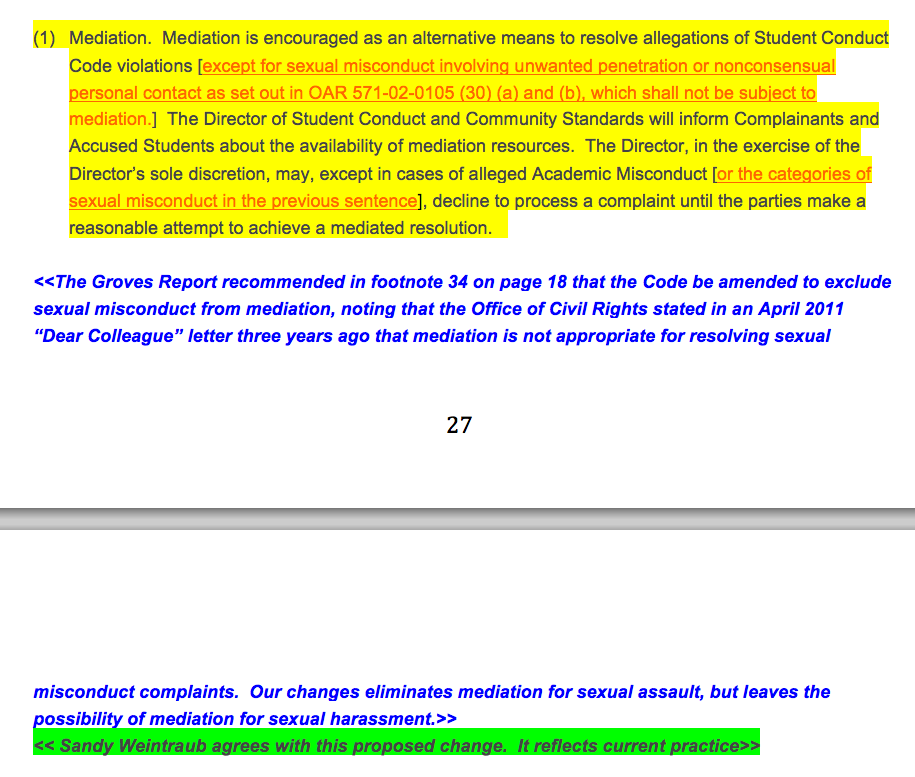
The shift away from rights of accused and new language. Re grading explicit prior consent should give civil libertarians at least some pause, even in the face of our dealing with such a serious problem. Not being a lawyer, I sure hope the somewhat countervailing views of Bonnie and forell have resulted in the right balance. The fact that the impetus originally came from the current DOE is certainly no reassurance.
Thanks for posting all of these, including all of the commentary. I have read parts here and there but this was the best place to see it all and understand changes, editorials, and rationale. Bonine and Forell deserve a meritorious service award to have done this as quickly as they did, in as thorough a way as they did. I also sense a positive vibe coming from the new Director Sandy and hope that this marks a significant moves towards collaboration. Thank you to all. Now let’s just hope Holmes does not get in the way……
Impressive and informative. Thanks for posting.
Holy Crap! This is the condensed version? GAAA! So is the wheel being reinvented here? Do the Feds have specific guidelines that can be copied & pasted into the official student conduct codes? If anything are some of them missing? What of the accused being provided legal fees/representation but not the (victim) survivor? Is it Federal guidelines compliant? Is there a place where specific timelines of when & how admin will address these issues? Remember the guy the admin hired to review the U of O compliance, works in a university that gets a FAIL from the Feds. Should a new review be done by someone who has better credentials? I admire you brave souls for hashing this out.
The accused has the OPPORTUNITY to seek legal counsel at no charge but it is not guaranteed (based on eligibility and conflict rules), nor is it automatically granted upon receiving a charging letter (Notice of Allegation).
Posted with permission of Peter Warnek, Philosophy:
On May 28, 2014, at 1:15 PM, Peter Warnek PhD wrote:
I am sending this out again, since when I sent it out the first time last week I got almost no response. Would someone please explain why it makes sense to treat cases of sexual misconduct as exceptions with regard to the normal burden of proof for misconduct? The OCR Dear Colleague Letter is controversial and in itself does not justify this change. I encourage you again to look at all the links below. http://collegeinsurrection.com/2012/09/education-dept-unlawfully-changes-burden-of-proof-in-college-sexual-harassment-cases/
A former OCR attorney has stated that the “Preponderance Mandate” letter was unlawful: http://www.thefire.org/former-ocr-attorney-dear-colleague-letters-preponderance-mandate-unlawful/ And still more significant is the fact that the Department of Education’s recent rule making session has now actually discarded this requirement for the preponderance of evidence standard: http://www.thefire.org/dept-of-education-rulemaking-session-ends-on-positive-note-for-student-due-process-rights/ In other words, the Department of Education itself–the Department that houses the very office that originally sent out this Dear Colleague Letter–will no longer be mandating the lower standard of proof that we are considering implementing at this point. See also the article in Inside Higher Ed: http://www.insidehighered.com/news/2014/04/02/education-department-rulemaking-panel-oks-new-set-campus-safety-rules#sthash.4RacXpWe.dpbs In particular, I think it is worth noting this passage from that article: “While guidance from the Office of Civil Rights is watched closely because it reflects the administration’s interpretation of the law, it is not binding on institutions.” In other words, compliance with Title IX does not follow directly from the OCR interpretations as spelled out in the Dear Colleague Letter. This article by Wendy Kaminer from The Atlantic also takes up the issue of institutional liability for failing to protect the rights of the accused. http://www.theatlantic.com/national/archive/2012/03/whats-wrong-with-the-violence-against-women-act/254678/
As I see it, our institutional compliance with Title IX does not require that cases of alleged individual misconduct be decided through preponderance of evidence, since preponderance of evidence only pertains to the matter of deciding institutional compliance and does not apply to deciding whether misconduct occurred. See also this article that gives a legal argument as to why the OCR’s Dear Colleague Letter violates the Bill of Rights. http://www.hoover.org/publications/defining-ideas/article/107626 Former U.S. Civil Rights Commissioner, Jennifer C. Braceras, has also condemned the position taken by the Dear Colleague Letter. See “Civil Rights Wronged on Campus,” Boston Herald, August 29, 2011. In addition, the American Association of University Professors has sent a letter to the Department of Education explicitly criticizing the preponderance of evidence standard mandated by the Dear Colleague Letter. http://dailycaller.com/2011/08/18/the-american-association-of-university-professors-expresses-concern-over-dept-of-educations-new-mandates/
I agree with many of the proposed changes to the Student Conduct Code. But I think it would be rash and irresponsible to alter the burden of proof standard without more legal reflection. We should not make this decision in a reactive and ignorant manner, but should be committed to ensuring due process and protecting the rights of everyone involved, including the accused.
My hope is that we can decide this matter through an open and joint deliberation. I welcome your responses.
Peter Warnek